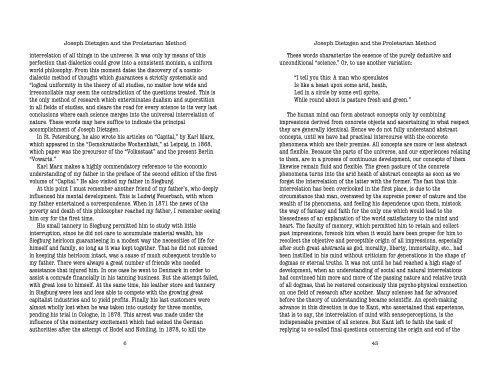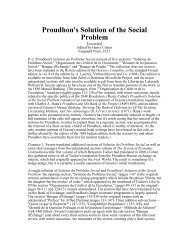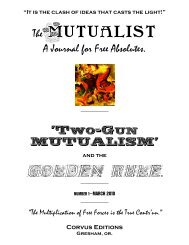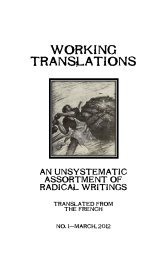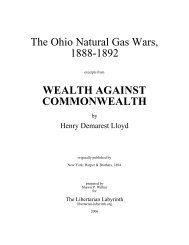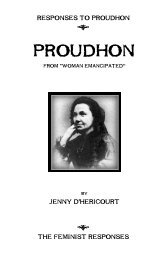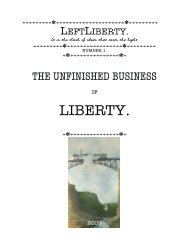JOSEPH DIETZGEN: - The Libertarian Labyrinth
JOSEPH DIETZGEN: - The Libertarian Labyrinth
JOSEPH DIETZGEN: - The Libertarian Labyrinth
You also want an ePaper? Increase the reach of your titles
YUMPU automatically turns print PDFs into web optimized ePapers that Google loves.
Joseph Dietzgen and the Proletarian Method<br />
interrelation of all things in the universe. It was only by means of this<br />
perfection that dialectics could grow into a consistent monism, a uniform<br />
world philosophy. From this moment dates the discovery of a cosmicdialectic<br />
method of thought which guarantees a strictly systematic and<br />
“logical uniformity in the theory of all studies, no matter how wide and<br />
irreconcilable may seem the contradiction of the questions treated. This is<br />
the only method of research which exterminates dualism and superstition<br />
in all fields of studies, and clears the road for every science to its very last<br />
conclusions where each science merges into the universal interrelation of<br />
nature. <strong>The</strong>se words may here suffice to indicate the principal<br />
accomplishment of Joseph Dietzgen.<br />
In St. Petersburg, he also wrote his articles on “Capital,” by Karl Marx,<br />
which appeared in the “Demokratische Wochenblatt,” at Leipzig, in 1868,<br />
which paper was the precursor of the “Volksstaat” and the present Berlin<br />
“Vowarts.”<br />
Karl Marx makes a highly commendatory reference to the economic<br />
understanding of my father in the preface of the second edition of the first<br />
volume of “Capital.” He also visited my father in Siegburg.<br />
At this point I must remember another friend of my father’s, who deeply<br />
influenced his mental development. This is Ludwig Feuerbach, with whom<br />
my father entertained a correspondence. When in 1871 the news of the<br />
poverty and death of this philosopher reached my father, I remember seeing<br />
him cry for the first time.<br />
His small tannery in Siegburg permitted him to study with little<br />
interruption, since he did not care to accumulate material wealth, his<br />
Siegburg heirloom guaranteeing in a modest way the necessities of life for<br />
himself and family, so long as it was kept together. That he did not succeed<br />
in keeping this heirloom intact, was a cause of much subsequent trouble to<br />
my father. <strong>The</strong>re were always a great number of friends who needed<br />
assistance that injured him. In one case he went to Denmark in order to<br />
assist a comrade financially in his tanning business. But the attempt failed,<br />
with great loss to himself. At the same time, his leather store and tannery<br />
in Siegburg were less and less able to compete with the growing great<br />
capitalist industries and to yield profits. Finally his last customers were<br />
almost wholly lost when he was taken into custody for three months,<br />
pending his trial in Cologne, in 1878. This arrest was made under the<br />
influence of the momentary excitement which had seized the German<br />
authorities after the attempt of Hodel and Nobiling, in 1878, to kill the<br />
6<br />
Joseph Dietzgen and the Proletarian Method<br />
<strong>The</strong>se words characterize the essence of the purely deductive and<br />
unconditional “science.” Or, to use another variation:<br />
“I tell you this: A man who speculates<br />
Is like a beast upon some arid, heath,<br />
Led in a circle by some evil sprite,<br />
While round about is pasture fresh and green.”<br />
<strong>The</strong> human mind can form abstract concepts only by combining<br />
impressions derived from concrete objects and ascertaining in what respect<br />
they are generally identical. Hence we do not fully understand abstract<br />
concepts, until we have had practical intercourse with the concrete<br />
phenomena which are their premise. All concepts are more or less abstract<br />
and flexible. Because the parts of the universe, and our experiences relating<br />
to them, are in a process of continuous development, our concepts of them<br />
likewise remain fluid and flexible. <strong>The</strong> green pasture of the concrete<br />
phenomena turns into the arid heath of abstract concepts as soon as we<br />
forget the interrelation of the latter with the former. <strong>The</strong> fact that this<br />
interrelation has been overlooked in the first place, is due to the<br />
circumstance that man, overawed by the supreme power of nature and the<br />
wealth of its phenomena, and feeling his dependence upon them, mistook<br />
the way of fantasy and faith for the only one which would lead to the<br />
blessedness of an explanation of the world satisfactory to the mind and<br />
heart. <strong>The</strong> faculty of memory, which permitted him to retain and collect<br />
past impressions, forsook him when it would have been proper for him to<br />
recollect the objective and perceptible origin of all impressions, especially<br />
after such great abstracta as god, morality, liberty, immortality, etc., had<br />
been instilled in his mind without criticism for generations in the shape of<br />
dogmas or eternal truths. It was not until he had reached a high stage of<br />
development, when an understanding of social and natural interrelations<br />
had convinced him more and more of the passing nature and relative truth<br />
of all dogmas, that he restored consciously this psycho-physical connection<br />
on one field of research after another. Many sciences had far advanced<br />
before the theory of understanding became scientific. An epoch-making<br />
advance in this direction is due to Kant, who ascertained that experience,<br />
that is to say, the interrelation of mind with sense-perceptions, is the<br />
indispensable premise of all science. But Kant left to faith the task of<br />
replying to so-called final questions concerning the origin and end of the<br />
43


